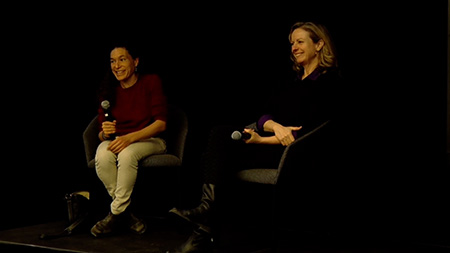Archive Event Highlight

Michelle Shephard Discusses Her Ethical Dilemmas in Making ‘The Perfect Story’
by Chad Bouchard
Michelle Shephard was on a reporting trip to Mogadishu for the Toronto Star in 2010 when she met Ismael Khalif Abdulle, a 17-year-old Somali refugee who had his right hand and left foot cut off by the terrorist group Al Shabab.
She wrote his story for the paper – about his rejection of terrorists’ attempts to recruit him, and about his capture, torture, and daring escape from the group. Shephard’s articles helped sparked fundraisers by Somalian diaspora living in Canada that helped him flee from Mogadishu and immigrate to Harstad, Norway, where he ultimately became a citizen.
Shephard remained in touch with Abdulle, and after nearly 10 years, as she had moved out of newspaper journalism and into documentary filmmaking, the two decided to make a film about his return to Mogadishu. They filmed his voyage and reunion with family, during which Shephard noted Abdulle was becoming agitated and evasive. Later, the direction of the film took a dramatic turn when Abdulle told Shephard he had important information to confess. Key parts of the narrative he’d been repeating to her for the last decade were fabricated, including the reason he’d been harmed by Al Shabab. Abdulle even told her that he had shaped his story to conform to what he thought Shephard and her readers in Canada wanted to hear.
“This is not the film we set out to make,” she said during a Q&A and screening of The Perfect Story hosted by the OPC in Toronto on Feb. 2. “Then the film changed. Then it became a film about journalism.”
Shephard didn’t want to become an integral part of the story, she said, and “had no intention of being in the film as much as I was. I can definitely say it will be the only time I’m on that side of the camera.
The film, which took about four years to make, follows how Shephard was drawn by Abdulle’s “simple” story of an innocent refugee who stood up to a powerful terrorist group, escaping to pursue an education and a better life. But his confession made the story much more ambiguous, and shed light on the gravitational pull of partial truths, compelling stories and journalists’ role in telling them.
“It became really a challenge, ethically, morally. Do we continue with this film? If we do, what does it become?” she said. “It was about – what do we do in journalism? How do we tell stories? Are we storytellers or story takers?”
The moderator of the discussion was Anna Mehler Paperny, a Toronto-based correspondent for Reuters covering migration and health, among other beats. She asked Shephard how, because so many stories are “messy by nature,” to resist the pull of “the perfect story, and that simplicity of narrative” even when editors are guiding stories in that direction.
“There is a part of you that likes that kind of tidy, ‘Hollywood’ narratives,” Shephard said, adding that in order to avoid such mistakes, journalists and editors have to remain aware that they’re drawn to those stories. “That makes you question things or maybe not look for them in the same way, and not simplify stories.”
Before making the film, Shephard spent more than two decades working as a correspondent covering national security for the Star, winning three of Canada’s National Newspaper Awards and the Michener Award. Her other filmmaking credits include the Emmy-nominated film Guantanamo’s Child and The Way Out. Shephard was also a producer on the award-winning film Uyghurs: Prisoners of the Absurd.
The Perfect Story, co-produced by Frequent Flyer Films and the National Film Board of Canada, won the Calgary International Film Festival’s top Canadian documentary award in September last year and was broadcast on some platforms in October. It is not currently available on streaming services outside Canada, but updates will be posted on the film’s website here.
Click the window below to watch a playlist of clips from the program.



